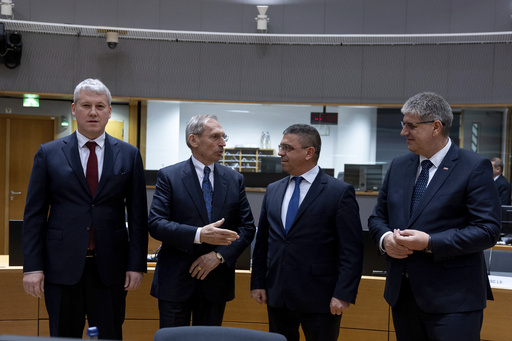
BRUSSELS — On Thursday, several nations within the European Union reaffirmed their choice to swiftly suspend asylum applications for Syrian migrants, although they indicated that it is premature to contemplate the return of the countless individuals who have fled Syria since the onset of conflict in 2011.
Countries including Austria, Belgium, Germany, Greece, Finland, Ireland, Sweden, and the non-EU country of Norway have halted asylum requests from Syrians following the recent fall of Bashar Assad. Meanwhile, France is deliberating on implementing similar measures, at least until there is greater clarity regarding the new governance and security situation in Syria.
It’s important to note that the recent decisions do not equate to the deportation of Syrian asylum seekers. The European Commission, which serves as the EU’s executive office, has stated that the current conditions for ensuring safe and voluntary returns to Syria are not yet established.
“We need to wait a few more days to see where Syria is heading now,” remarked Nancy Faeser, Germany’s Interior Minister. She raised concerns about the situation in Syria, particularly regarding the welfare of minority groups and the general safety of its people, suggesting that any discussions about repatriation must consider these critical factors.
When asked whether organizing repatriations at the EU level might be wise, Faeser agreed it would be pragmatic to coordinate such efforts collectively. Nonetheless, she highlighted that Syrians residing in Germany who abide by its laws and contribute to society are welcome to remain in the country, noting that there are currently over 47,000 pending asylum claims from Syrians in Germany, a primary destination for those escaping the conflict.
“This is not a long-term pause as far as I’m concerned,” stated Helen McEntee, the Irish Justice Minister. She indicated that while the end of Assad’s regime is a positive development, the uncertainty surrounding the future of Syria remains a pressing concern.
The influx of more than one million refugees to Europe in 2015, primarily fleeing the Syrian conflict, ignited a significant political crisis within the EU, as member nations debated responsibilities for hosting these individuals and whether to compel assistance from others. These tensions persist.
Statistics from the EU’s asylum agency reveal that nearly 14,000 Syrians sought international protection in Europe from the start of the year until September. This follows a total of around 183,000 asylum applications made by Syrians in the previous year. On average, approximately one-third of these applications are approved.
Despite the prevailing uncertainty, hundreds of Syrian refugees gathered at border crossings in southern Turkey earlier this week, showing eagerness to return to Syria following the upheaval of Assad’s government.
In the wake of Assad’s swift downfall, Ahmad al-Sharaa, a key rebel leader formerly referred to as Abu Mohammed al-Golani, has attempted to comfort Syrians by asserting that his organization, Hayat Tahrir al-Sham (HTS), does not aspire to total control over the country and will maintain government services.
HTS is listed on the EU’s anti-terrorism sanctions roster due to its affiliation with Al-Qaeda, which results in the freezing of any assets it holds in Europe, as well as restrictions on European individuals and businesses engaging with or funding the group. Al-Golani is also subject to travel prohibitions and asset freezes.
Belgium’s interior ministry expressed on Thursday that all 27 EU nations must keep a close watch on the migration dynamics from Syria, particularly in light of concerns that individuals loyal to Assad may seek asylum in Europe. According to reports, approximately 100 Belgian nationals are currently in Syria, with intelligence indicating that eight of them may have connections to HTS.
On Tuesday, the EU’s leading diplomat voiced apprehensions that if the territorial integrity and the rights of minority communities are not safeguarded, Syria might descend into violent chaos similar to what Iraq, Libya, and Afghanistan have experienced.
“The transition will present significant challenges in Syria and the region,” EU foreign policy chief Kaja Kallas informed European lawmakers during a dedicated hearing.
The United Nations refugee agency has advocated for “patience and vigilance” regarding the treatment of Syrians seeking international protection, emphasizing that much will depend on the willingness of Syria’s new leadership to uphold law and order.
